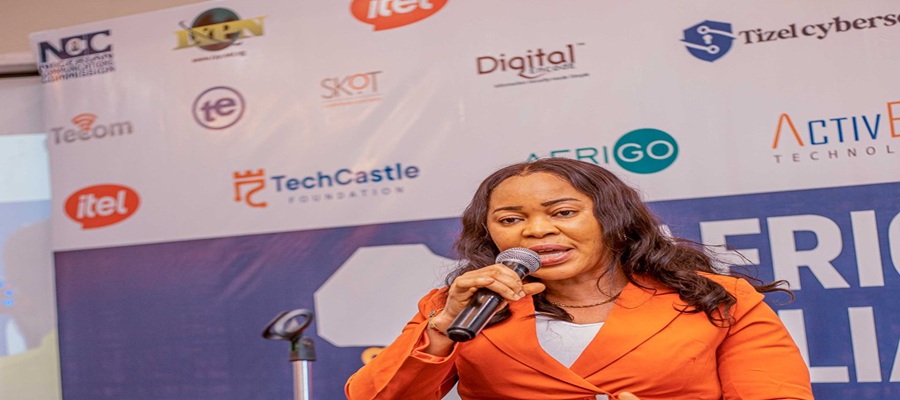Telecom
Collaborations Between FG And MTN Critical in Achieving 70% Internet Penetration By 2025 – Onyinye Ikenna-Emeka

Nigeria is poised to achieve a 70 percent internet penetration in urban and rural areas by 2025 as desired by the Federal Government if tactical collaborations between the private sector and the public sector are effectively utilised.

Onyinye Ikenna-Emeka
This was stated by Onyinye Ikenna-Emeka, General Manager for Fixed Broadband at MTN, in a recent interview with Arise TV on broadband connectivity in Africa’s most populous nation.
The Federal Government’s Broadband plan further specified the kind of internet speeds expected for both urban and rural areas; 25mbps and 10mbps respectively.
Onyinye Ikenna-Emeka, noted that MTN Group’s Strategic Ambition 2025 is in close alignment with the Federal Government’s broadband targets. According to her, the technology provider’s intent is to deliver the right level of effective digital solutions to power Africa’s growth.
For Nigeria to achieve its goal of a globally recognised digital economy, Ikenna-Emeka, an internet connectivity expert, believes that the nation will require concerted efforts by the Federal Government, public and private stakeholders to boost broadband penetration. Ikenna-Emeka expresses optimism that with existing and new policies, the country is on the right path.
“When we look back at 2012 when we had just about 6 per cent internet penetration to where we are today, there is a significant improvement. As of the end of May this year, we had about 43.6 percent penetration. That is quite encouraging,” she says.
“A lot of work is still being done by the Federal Government and organisations like MTN to achieve the right levels of broadband penetration. The journey has already started and further collaborations will help us to get better.”
To improve internet connectivity in their locality, more than a dozen African countries have tested or are planning to roll out the 5G network in the next few years.
The next-gen network is predicted to contribute an additional $2.2 trillion to Africa’s economy by 2034. MTN, demonstrating its commitment to providing quality internet access to Nigerians, has laid the groundwork to provide the 5G service in several parts of the country in the coming months.
Enunciating MTN’s role as a driver of quality network across the country, Ikenna-Emeka says “Today, what is most prevalent is the fixed wireless access and that is the technology that is being adopted by all operators globally. That’s what we want to scale and accelerate in our drive to achieve broadband penetration.
“We’re very shortly going to launch the 5G technology. There is also a lot of progress we’ve made in fibre optics which is another prevalent technology. This, along with the 3G, 4G, and 5G networks will provide us with the ability to serve more market segments and more different sectors.”
The internet connectivity specialist further expounds that continued acceleration of internet access and the ability to adapt and expand on new technologies will bolster broadband connectivity that would match Nigeria’s growing population.
On the challenges of expanding internet connectivity in unconnected areas in the country, she says “Recently, we have received some legislation from the Federal Government to improve internet access in the rural or less connected states and that is critical in driving broadband penetration and connectivity.”
“One of the ways we are driving that penetration as a telco is by ensuring that we leverage on our mix of technologies. We currently have access to 3G, 4G, and coming soon, the 5G. And we are going to utilise this mix of technologies to deliver fit-for-purpose connectivity in different areas in Nigeria,” she adds.
Recently, international companies like Meta and Starlink have begun to adopt satellites in providing internet connectivity, and Africa has been encouraged to adopt similar technological measures to boost its developing digital landscape.
Ikenna-Emeka expresses belief that it speaks to the need for increased collaboration to drive penetration.
“It is quite interesting and speaks to the localisation of global trends – global digital transformation initiative. It’s a welcome development because to achieve the levels of penetration that we require, both at urban and rural levels, and to ride on the right levels of partnerships and collaborations, we will be requiring a mix of technologies. We look forward to seeing how that plays out in the future,” she says.
MTN Nigeria recently launched its home broadband services tailored to provide fast and reliable internet access in homes across Nigeria. With the imminent commercial deployment of the 5G network, Nigeria will be hoping to expand its internet penetration and connectivity to achieve its ambition of a near-perfect digital economy in the next three years.
Telecom
Nigeria Lacks AI-Ready Data Centres, Trails in Capacity – Nnamani

Engr. Ikechukwu Nnamani, chief executive officer, Digital Realty Nigeria, says the country currently has no data centres designed for core Artificial Intelligence (AI) applications despite the presence of over 300 AI firms operating locally.

Engr.Nnamani
Nnamani made the disclosure at the Nigeria Information Technology Reporters Association (NITRA) Breakfast with CEOs in Lagos, stressing that AI is driving the next phase of digital evolution but Nigeria’s facilities remain unprepared for its intensive demands.
“There’s no data centre in Nigeria that is AI ready. None,” he said, noting that while cloud services exist, core AI infrastructure is absent, forcing local companies to rely on foreign resources.
He projected that AI-enabled data centres could emerge in two to three years through global players such as Digital Realty, citing its South African subsidiary, Teraco, which operates Africa’s largest facility.
He explained that one Teraco site exceeds the combined capacity of all Nigerian data centres and has already implemented liquid-cooled AI-ready infrastructure.
On national capacity, Nnamani revealed that Nigeria lags behind cities such as Toronto, Cape Town and London, with most facilities concentrated in Lagos. He said active IT loads in Nigeria are often just one to two megawatts despite larger design claims.
According to him, true metrics should be based on “active IT load” figures, not potential capacity. He estimated construction costs at between 10 and 15 million dollars per megawatt, noting that private firms rarely disclose totals.
Current installed capacity stands at 56.1 megawatts in 2025, projected to reach 218 megawatts by 2030, but distribution remains skewed.
Nnamani warned that the imbalance risks latency, uptime failures and poor user experience for non-Lagos users due to fibre vulnerabilities.
He advocated at least two data centres per state capital — about 72 to 74 nationwide — alongside transmission networks and content growth to support digital economy goals.
He described power shortages as opportunities, despite dedicated plants costing about one million dollars per megawatt.
Highlighting Digital Realty’s milestones since acquiring Medallion Communications in 2021 and rebranding in 2023, Nnamani said the company had invested in roads and power feeds for the 2Africa submarine cable site in Lekki.
He added that the project had created jobs, training opportunities and housing growth in the area, with hyper-scale AI facilities planned ahead.
Speaking at the event, Mr. Chike Onwuegbuchi, Chairman, Nigeria Information Technology Reporters Association (NITRA) has lauded Engr. Ikechukwu Nnamani for his transformative contributions to Nigeria’s ICT sector, describing him as a beacon of innovation and digital excellence.
He praised Nnamani’s pioneering work in data center infrastructure, noting that his initiatives have significantly elevated the country’s technological framework.
Onwuegbuchi highlighted Nnamani’s recent recognition as Data Center Leader of the Year, calling it a testament to his unwavering commitment to advancing Nigeria’s digital economy.
Nnamani, who served as the keynote guest at the event, delivered a pre-recorded video presentation before engaging participants in a dynamic question-and-answer session.
His appearance, according to Onwuegbuchi, is set to become an annual tradition, underscoring his dedication to mentoring and guiding the ICT community.
“This is the kind of leadership that inspires confidence in Nigeria’s digital future,” Onwuegbuchi remarked, urging stakeholders to emulate Nnamani’s innovative spirit and commitment to excellence.
The event marked another milestone in NITRA’s ongoing efforts to foster collaboration and strategic development among ICT professionals nationwide, reinforcing the association’s role as a catalyst for growth in Nigeria’s technology ecosystem.
Telecom
Anambra Leads Southeast in Digital Governance Under Soludo’s ICT Agenda

Anambra State is quietly engineering one of Nigeria’s most ambitious transformations in public governance, one powered by artificial intelligence, expanded broadband infrastructure and deep data analytics.

Mr. Chukwuemeka Fred Agbata (CFA), Managing Director, Anambra State ICT Agency, in a group photograph with media executives during a media parley in Lagos.
At the centre of this shift is Governor Prof. Chukwuma Charles Soludo, CFR, whose administration is redefining how government interfaces with citizens.
Speaking during an interactive session with media executives in Lagos, Chukwuemeka Fred Agbata (CFA), the Managing Director, Anambra State ICT Agency, explained that the administration’s digital-first approach is reshaping how government engages citizens and delivers services.
Agbata said the Soludo administration is intentional about embedding technology into governance at scale.
“Governor Soludo’s vision is clear, a smarter, faster, more efficient government driven by data, innovation and citizen-focused digital tools,” he said.
Agbata noted that the state has adopted extensive data analytics to improve planning, service delivery and overall decision-making.
He explained that AI-driven analytics are now helping the government understand citizen needs, plan interventions and monitor impact more effectively.
He mentioned that the state’s previous use of data modelling in political engagement demonstrated the power of structured data but stressed that the real goal is institutionalising data culture across government, not just elections.
“We sit on rich datasets today; from demographic insights to service requests, and we are using them to build a more responsive government,” he said.
The ICT boss highlighted the state’s work on conversational AI systems that will allow citizens to interact with government easily, even in local languages.
“Whether literate or illiterate, people should soon be able to speak to AI in an indigenous language and have their requests processed,” he said.
“That’s where governance is going, and Anambra intends to lead.”
Highlighting Broadband Expansion as one of the biggest wins of Governor Soludo’s administration, Agbata emphasised that broadband penetration remains central to achieving the state’s digital agenda.
He credited Governor Soludo’s progressive Right-of-Way policy and proactive industry engagement for accelerating fibre deployment across communities.
“When ISPs begin travelling to Anambra on their own, it shows they see good policy and a viable market,” he said.
Today, more households in semi-urban communities are enjoying reliable fibre connections something CFA said was almost impossible in previous years..
CFA also disclosed that Anambra continues to pursue the establishment of an Internet Exchange Point to localise traffic and reduce cost while improving speed.
“Localising traffic means your data won’t travel to Lagos or Amsterdam before returning,” he explained.
He noted that although technical requirements have caused delays, significant progress is expected in 2026.
Agbata added that national assessments have recognised Anambra’s advancement in digitisation and reforms.
“According to BudgIT and other national bodies, Anambra ranks number one in the Southeast in ease of doing business and transparency,” he said.
He attributed the growth to healthy inter-state competition and measurable reforms championed by Governor Soludo.
Agbata praised the young professionals powering the state’s digital work, particularly in data analytics and infrastructure mapping.
He also highlighted the vital role of industry partnerships:
“Relationships matter. If we fully deploy just 20% of the relationships we have within and outside the country, Anambra would be on another level.”
He cited instances where collaboration with telecom executives led to quick fixes and infrastructure deployment in the state.
Agbata thanked the Lagos media community for their continuous support in making the Anambra’s digital revolution seen and appreciated by all.
“We don’t take your support for granted. You have helped amplify Anambra’s digital transformation story,” he said.
As Anambra deepens investments in digital infrastructure, AI systems and data-driven governance, Agbata said the state is positioning itself as the emerging technology and innovation hub of the Southeast.
“There is a generation coming that is digital-first. Our responsibility is to build systems ready for them,” he said.
Telecom
Africa Must Build Its Own Cybersecurity Intelligence, Says Tizel CEO At AfriTech 5.0

As Africa edges toward an estimated 750 million internet users by the end of 2025, the continent’s expanding digital footprint is increasingly matched by vulnerabilities that threaten its economic and national security.

Happiness Obioha, Managing Director and Chief Executive Officer of Tizel Cybersecurity
This concern took centre stage at the Africa Tech Alliance Forum (AfriTech 5.0), where Happiness Obioha, the Managing Director and Chief Executive Officer of Tizel Cybersecurity, delivered one of the event’s most compelling arguments for a new cybersecurity paradigm rooted in African intelligence rather than foreign technology.
Speaking on the theme “Beyond Firewalls: The Case for Homegrown Cybersecurity Intelligence in Africa,” Obioha maintained that Africa’s cybersecurity risks cannot be effectively mitigated with imported solutions that were never designed for the continent’s distinct digital realities.
She described Africa’s cyber landscape as one defined by unique threat actors, infrastructural limitations, cultural nuances, and business patterns that global security platforms often fail to understand.
According to her, relying solely on perimeter-based defenses such as firewalls is no longer adequate in a world where cyberattacks grow more adaptive, persistent, and sophisticated.
Obioha argued that Africa’s dependence on generic global tools has created a critical gap in the continent’s ability to detect, interpret, and respond to emerging threats, and explained that foreign cybersecurity systems frequently misread local attack patterns or fail to anticipate region-specific vulnerabilities.
As a result, many African organizations operate with a false sense of safety while facing increasingly complex threats ranging from ransomware and financial fraud to targeted breaches on government infrastructure.
The Tizel CEO emphasised that Africa’s long-term security lies in adopting intelligence-led approaches that draw from local insights, indigenous expertise, and continental research, and noted that such solutions allow faster and more precise threat detection because they are built with an understanding of local behaviour patterns and digital environments.
Beyond security improvements, she stressed that homegrown cybersecurity also strengthens national sovereignty, reduces capital flight, expands technical capacity, and creates jobs in one of the world’s fastest-growing sectors.
Obioha cited Tizel Cybersecurity as an example of what locally grounded innovation can achieve, explaining that the company’s model integrates contextual intelligence, real-time monitoring, rapid incident response, and strict adherence to regulatory frameworks.
According to her, Tizel’s work with banks, telecom operators, government agencies, and SMEs demonstrates the measurable impact of Africa-specific cybersecurity architecture.
Among the results she highlighted were the prevention of a major ransomware attack in the financial sector, a significant reduction in network downtime for a telecom operator, and the deployment of effective real-time monitoring systems for a government agency.
She reinforced that Tizel’s success is built on its deep understanding of the African digital ecosystem, a familiarity she described as indispensable for delivering cybersecurity that genuinely protects African institutions.
The region’s business culture, infrastructural diversity, and evolving digital habits, she said, can only be accurately interpreted by experts who operate within the same environment.
Obioha urged African enterprises and governments to take a more deliberate approach toward securing their digital future, and encouraged them to re-examine their cybersecurity posture, invest in indigenous intelligence-driven solutions, and build internal teams equipped to respond to emerging threats.
The survival and competitiveness of African businesses, she noted, will increasingly depend on their ability to align security strategies with the realities of the continent’s rapidly evolving digital economy.
“Africa’s digital future is promising,” she concluded, “but it must be secured with intelligence and innovation that come from within the continent.”

 News3 days ago
News3 days agoPAPSS Cowry to Benefit Manufacturers, SMEs

 General News3 days ago
General News3 days agoManufacturers Block More Ransomware, But Data Theft Surges – Sophos Report

 Telecom3 days ago
Telecom3 days agoMTN Nigeria Launches Y’ello Data Gifting Campaign as Digital Connectivity Shapes Festive Celebrations

 E-Financial3 days ago
E-Financial3 days agoAccess Bank’s Digital Innovation Earns Top Financial Inclusion Award

 E-Financial3 days ago
E-Financial3 days agoCBN’s New Cash Policy: A Welcome Liberalisation or a Risky Retreat?

 Broadcasting3 days ago
Broadcasting3 days agoNIPR Postpones Maiden PRICE Awards to January 25, 2026

 Telecom3 days ago
Telecom3 days agoAfrica Must Build Its Own Cybersecurity Intelligence, Says Tizel CEO At AfriTech 5.0

 Telecom3 days ago
Telecom3 days agoMTN Partners with SMEDAN to Drive Digital Growth and Job Creation Nationwide























